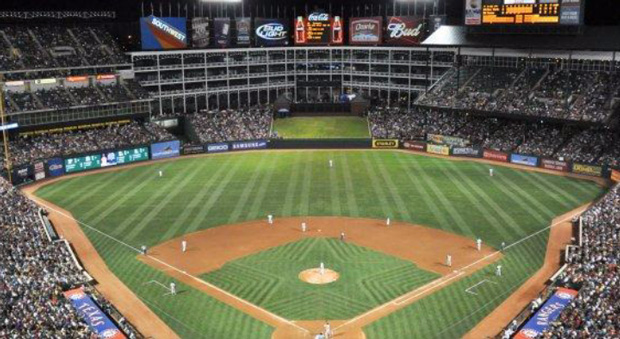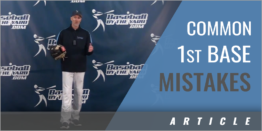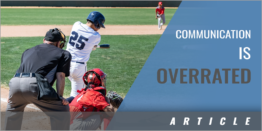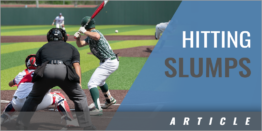| To Hug the Line or Not? |
| By: Bob McCreary
Provided by: Baseball By The Yard Most "Old School" coaches will have their third baseman and first baseman hug the line late in the game if they are winning by a run or, as might be the case in the photo, the runner on first is the tying or winning run. "Hugging the line" means moving the position player (1st or 3rd) closer to the foul line before the pitch. In the picture above, the first baseman is hugging the line. The third baseman is not. The reason for hugging the line late in the game is to help prevent a hitter from getting an extra base hit. In the picture above, if the hitter were to smoke a ball down the left field foul line on the ground or as a low line drive, the ball will roll all the way into the corner which will result in at least a double. The runner on second will score easily and if the runner on first is fast, he might score as well. If the batter were to smoke a similar ball down the first base line, the picture shows the first baseman in a position to catch or at least stop the ball which would prevent the extra base hit and the run(s) from scoring. "But if you move towards the line, don't you make it easier to hit the ball through the larger hole to the third baseman's left or the first baseman's right?" Yes, but when that occurs, the outfielder will usually be able to get to that ball quick enough to keep the batter from getting past first base on the hit. With a runner on second, you also give the outfielders a better chance of throwing the runner out at home plate since a ball hit through the hole will allow the outfielder to charge straight ahead for the ball instead of having to travel far towards the line to get to the ball before throwing. I described this as an "Old School" strategy because some coaches no longer, in part or fully, agree with this strategy. I don't know what the actual statistics are but some coaches claim that more balls are hit to the third base and first base holes than down the lines. They believe by hugging the lines, you are in reality making it easier for hitters to get on base . Some even suggest moving the fielders away from the lines would make more sense since, in their opinion, more balls are hit that way. Other coaches never hesitate to hug the lines with both players. My view is that hugging the lines is a good thing but I normally do not move both fielders at the same time. I'll use the photo above again as an example. In that scene, a left handed hitter is batting. Hopefully, before the ball is hit, I will know whether or not the batter is a pull hitter or an opposite field hitter. A quick read of his previous swings early in the game will hopefully tell me. I also should add to the mix the type of pitcher who is on the mound. If he is a very hard thrower, it is more likely the batter will hit the ball the other way. If he is an off-speed guy, the hitters are probably more likely to pull the ball. If the left handed hitter is a pull hitter and the pitcher is an off-speed guy, I probably would have the first baseman hug the line but have the third baseman play in his normal spot. The opposite would be true if the batter was right handed. I believe that most hitters hit towards one line but not the other. Of course, any strategy a coach uses has pros and cons. Whichever one the coach settles on is fine. They all have merit. The important thing is for each coach to give some thought to this, weigh the pros and cons, and decide on a strategy that best fits his players and the situations they face. |








